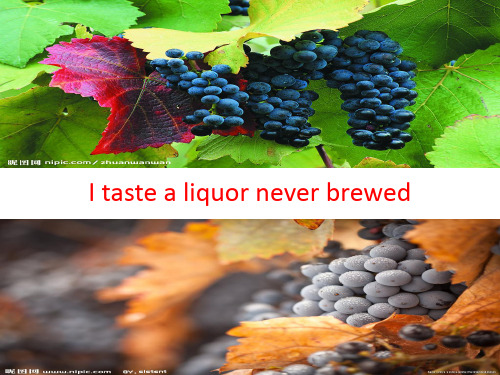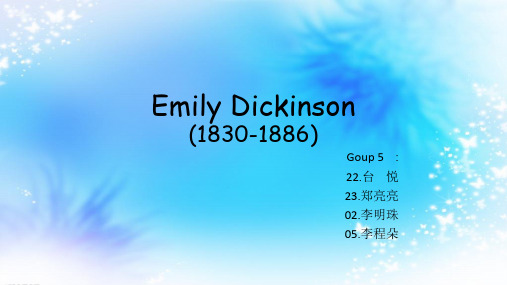艾米莉狄金森Itastealiquorneverbrewed英文版简介分析
- 格式:ppt
- 大小:1.60 MB
- 文档页数:13


①I’m Nobody!我是无名之辈-Emily DickinsonI’m nobody! Who are you?我是无名之辈!你是谁?Are you nobody, too?你也是无名之辈吗?Then there’s a pair of us----don’t tell!那么我们就是一对儿了!千万不要透露出去They’d banish us, you know!不然我们都会被他们驱逐,你知道。
How dreary to be somebody!做一个某某,是多么沉闷无聊How public, like a frog众人像是青蛙To tell your name the livelong day整日地把你谈论啊To an admiring bog!对着他们倾慕的泥沼我是无名之辈艾米莉·狄金森我是无名之辈,你是谁?你,也是,无名之辈?这就凑成一双,别声张!你知道,他们会大肆张扬!做个,显要人物,好不无聊!像个青蛙,向仰慕的泥沼——在整个六月,把个人的姓名聒噪——何等招摇!This poem is Dickinson’s most famous and most defense of the kind of spiritual privacy she favored, implying that to be a Nobody is a luxury incomprehensible to a dreary somebody—for they are too busy keeping their names in circulation. But to be somebody is not as fancy as it seems to be.Emily DickinsonAs you probably noticed when you read this poem, none of the themes that I discussed in the Overview of Dickinson applies to this poem. My list was not meant to cover every topic Dickinson wrote on, nor does every poem she wrote fit neatly into a category.Dickinson adopts the persona of a child who is open, naive, and innocent. However, are the questions asked and the final statement made by this poem naive? If they are not, then the poem is ironic because of the discrepancy between the persona's understanding and view and those of Dickinson and the reader. Under the guise of the child's accepting society's values, is Dickinson really rejecting those values?Is Dickinson suggesting that the true somebody is really the "nobody"? The child-speaker welcomes the person who honestly identifies herself and who has a true identity. These qualities make that person "nobody" in society's eyes. To be "somebody" is to have status in society; society, the majority, excludes or rejects those who lack status or are "nobody"--that is, "they'd banish us" for being nobody.In stanza 2, the child-speaker rejects the role of "somebody" ("How dreary"). The frog comparison depicts "somebody" as self-important and constantly self-promoting. She also shows the false values of a society (the "admiring bog") which approves the frog-somebody. Does the word "bog" (it means wet, spongy ground) have positive or negative connotations? What qualities are associated with the sounds a frog makes (croaking)?Is there satire in this poem?Some readers, who are modest and self-effacing or who lack confidence, feel validated by this poem. Why?②To Make a Prairie…To make a prairieIt takes a clover and one bee,One clover and a bee,And revery.Revery alone will do,If bees are few.去造一个草原张祈试译去造一个草原需要一株三叶草和一只蜜蜂,一株三叶草和一只蜜蜂,还有梦。


英语学习资料:艾米莉经典英文诗:我是无名之辈
艾米莉经典英文诗:我是无名之辈
艾米莉·狄金森(Emily Dickinson)是美国传奇女诗人,在她有生之年,她的作品未能获得青睐,然而周遭众人对她的不解与误会,却丝毫无法低损她丰富的创作天分。
根据统计,艾米莉惊人的创作力为世人留下1800多首诗,包括了定本的1775首与新近发现的25首。
艾米莉的诗一洗铅华、不事雕饰、质朴清新,有一种“粗糙美”,有时又如小儿学语般幼稚。
I'm nobody!—Emily Dickinson 我是无名之辈
Emily Dickinson 艾米莉·狄金森
I'm nobody!Who are you?
我是无名之辈,你是谁?
Are younobody, too?
你也是无名之辈?
Then there's a pair of us--don't tell!
那咱俩就成了一对——别出声!
They'd banishi us, you know!
他们会排挤咱们——要小心!
How dreary to be somebody!
做个大人物多没劲!
How public, like a frog,
多招摇——像只青蛙
To tell your name the livelong day,对着欣赏的小水洼
To an admiring bog!
整日里炫耀自己的名号!。


狄金森英文爱情诗歌阅读艾米利·狄金森(1830.12.10—1886.5.15)是与怀特·惠特曼与艾伦·坡齐鸣于美国文学史上的大诗人。
下面是店铺带来的狄金森英文爱情诗歌阅读,欢迎阅读!狄金森英文爱情诗歌阅读篇一If You Were Coming in the Fall如果你在秋天到来If you were coming in the Fall,如果你在秋天到来,I’d brush the summer by我将轻拂夏日而过With half a smile, and half a spurn,半带微笑,半带弃绝,As Housewives do, a Fly。
如家庭主妇把苍蝇扑捉。
If I could see you in a year,如果能在一年之中将你盼来,I’d wind the months in balls—我将把月份缠绕成一个个纱球—And put them each in separate Drawers,把它们分开,各自放进抽屉,For fear the numbers fuse—以免这些数字熔合,不在分开—If only Centuries, delayed,如果只是延至数个世纪,I’d count them on my hand,我愿搬弄手指度日数数,Subtracting, till my fingers dropped逐日递减,直到手指全部掉入Into Van Dieman’s Land。
塔斯马尼亚岛屿的土地。
If certain, When this life was out—如果确定无疑,当今生度完—That your’s and mine, should be它应属于你和我,I’d toss it yonder, like a Rind,我愿把它,像果壳,扔向遥远,And take Eternity—去到来生把你赢得—But, now, uncertain of the length而目前,日期遥遥,Of this, that is between,等待无期,天各一方,It goads me, like the Goblin Bee—像妖蜂,使我伤痛不已—That will not state-it’s sting。
呼啸山庄中英文双语介绍Wuthering Heights《呼啸山庄》(Wuthering Heights),英国女作家艾米莉·勃朗特(Emily Brontë)的小说,也是她唯一的一部小说,于1847年首度出版。
当时因为内容对人性丑恶的描写而遭致非议,被称为是一本“可怕而野蛮”的书,书中写尽了寂寥的荒野、偏僻的古堡、粗暴的爱情,气氛阴郁而浓厚,被当时人所不容。
但是随着时间的推移,这部小说逐渐的被主流社会所认同,并且被认为是勃朗特姐妹所有的作品中最为出色的一部。
艾米丽独特的气质,对世界的感悟,对荒原的依恋和描写,给这部小说增添了独特的审美意味,这是这部小说明显不同于维多利亚时代其他小说的原因。
其中也继承了象征、恐怖和神秘等哥特小说手法。
小说的背景是十八世纪英格兰北部的约克郡,呼啸山庄的主人、恩肖先生(Earnshaw)带回一个身分不明的吉普赛男孩,取名希斯克利夫(Heathcliff),这位小男孩夺去了主人对小主人亨德利(Hindley)和他妹妹凯瑟琳(Catherine)的宠爱。
主人恩肖死后,亨德利从外地娶回一女子(法兰西斯),继承了山庄,为了报复,他把希斯克利夫贬为奴仆,并百般迫害,可是妹妹凯瑟琳却和他产生了爱情,希斯克利夫天性倔强,性格敏感而多疑,两人之间却又存在着激烈的冲突。
后来,凯瑟琳受外界影响,改而爱上有钱、成熟的画眉庄园的青年埃德加·林顿(Edgar Linton)。
使希斯克利夫在暴风雨之夜愤而出走,三年后再出现时,已经是一名富商,他的出现造成呼啸山庄诡异的气氛,希斯克利夫的爱变得偏激,他不但想报复凯瑟琳,还不放过她身边的每一个人,他用赌博赢得了山庄,亨德利成为他的仆人,亨德利最后死得不明不白,儿子哈里顿则成了奴仆。
他还故意娶了埃德加的妹妹伊莎贝拉(Isabella)为妻,造成兄妹失和,并施以迫害。
埃德加反对凯瑟琳和希斯克里夫继续来往,这使得凯瑟琳越来越忧郁,内心痛苦不堪的凯瑟琳在生产中死去。
I'm Nobady!赏析
【诗人简介】
艾米莉·狄金森(1830~1886)生于美国马萨诸塞州。
她深居简出,终生未婚,过着孤独的生活。
她平时在零碎纸片上秘密寄兴赋诗,不求名于时;所写的近1800首诗,大都是在她死后发表的,题材多限于个人的内心生活,善于以奇特的意象表现平常的生活事物,并把深邃的思想融入简短的诗句中。
她的抒情短诗多用四行诗体写成,喜用近似韵。
I’m Nobody, Who Are You?
Emily Dickinson
I’m Nobody, Who Are You?
Are you nobody, too?
Then there’s a pair of us—don’t tell!
They’d banish us, you know.
How dreary to be somebody!
How public, like a frog
To tell your name the livelong day
To an admiring bog!
【赏析】
本诗是诗人安贫乐道精神的自我表白。
诗的第一节似与朋友悄语。
第二节进一步向对方发表看法,把大人物比作泥水沼里的蛤蟆,在平直的语言中道出对世态炎凉的讥讽。
我是无名小卒,你呢?
艾米莉·狄金森
我是无名小卒,你呢?
你也是无名小卒?
那么我们恰好为伍——但不可说出!
要知道,他们会把我们驱逐。
做一个显要人物多么可怖!
到处露头,像一只青蛙似的,
终日朝着崇拜你的泥水池沼
报告你的名字!。